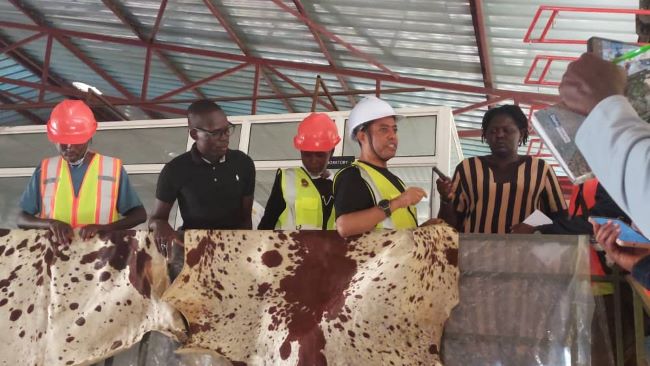LUWEERO, December 28, 2024 ––The revival of Kawumu Leather Industry [KLIU] is poised to begin the production of footwear and soles as it nurtures skilled talent and manage waste for a sustainable environment.
KLIU, located in Kawumu village, Makulubita Subcounty in Luweero district, is a presidential initiative and a practical intervention in Uganda’s leather value chain.
This initiative presents the opportunity to create over 1,000 jobs for young people, particularly those from local skilling centres.
According to Solomon Getu, the leather expert at KLIU, the company processes hides and skins, with 20 percent allocated to finished leather products, and 80 percent initially considered waste. However, he explained that the waste is being effectively managed.
Getu confirmed that the industry aims to become the best leather producer in Africa. He added that, starting in February 2025, they will begin producing footwear and shoe soles that will serve both the company and other local industries in Uganda.
“Besides leather, we are now set to add value by producing footwear and soles, not only for Kawumu Industry but also to support other investors in Uganda,” said Getu.
The industry expects to produce 4,000 pairs of shoes per day, with Getu stating that Kawumu will initially produce 2,100 pairs per day in a phased approach, while the remainder will be allocated to local industries.
“Since there are industries already producing footwear and soles, we will be supporting them as well,” he added.
Getu explained that the industry purchases hides and skins at between Shs 1,500 and Shs 2,200 per kilogramme, depending on quality. He encouraged local suppliers to deliver high-quality materials to enhance the production of top-quality products.
According to a report by the Ministry of Agriculture, Animal Industry and Fisheries [MAAIF] and Uganda Bureau of Statistics [UBOS] on hides and skins, cattle contribute 14.2 million units, goats 16 million, sheep 4.5 million, poultry 47.6 million, and pigs 4.1 million.
Anne Nangurura, the Human Resource Manager at KLIU, stated that the company currently employs 135 workers. Once footwear production begins, they expect to employ over 1,000 people.
“I encourage skilled youths to embrace the project, and when the time comes, apply for jobs to create wealth that will sustain your livelihoods,” said Nangurura.
She acknowledged that livelihoods have improved through the leather sector, as locals can now easily access leather from the industry.
“Previously, people could not afford to import leather, but with Kawumu Industry, anyone can walk in and purchase a piece to make shoes or other products,” Nangurura explained.
Manasse Opit, a leather technician at KLIU, added that they treat both solid and liquid waste produced by the industry in an environmentally friendly manner.
Buy your copy of thecooperator magazine from one of our country-wide vending points or an e-copy on emag.thecooperator.news
